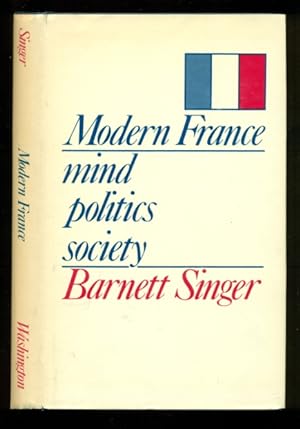9780295957913 - Modern France, Mind, Politics, Society by Singer, Barnett (1 results)
FeedbackSearch filters
Product Type
- All Product Types
- Books (1)
- Magazines & Periodicals (No further results match this refinement)
- Comics (No further results match this refinement)
- Sheet Music (No further results match this refinement)
- Art, Prints & Posters (No further results match this refinement)
- Photographs (No further results match this refinement)
- Maps (No further results match this refinement)
- Manuscripts & Paper Collectibles (No further results match this refinement)
Condition
- All Conditions
- New (No further results match this refinement)
- Used (1)
Binding
- All Bindings
- Hardcover (1)
- Softcover (No further results match this refinement)
Collectible Attributes
- First Edition (1)
- Signed (No further results match this refinement)
- Dust Jacket (1)
- Seller-Supplied Images (1)
- Not Print on Demand (1)
Free Shipping
- Free Shipping to U.S.A. (No further results match this refinement)
Seller Rating
-
Modern France, Mind, Politics, Society
Published by University of Washington Press, Seattle, WAshington, 1981
ISBN 10: 0295957913 ISBN 13: 9780295957913
Seller: Don's Book Store, Albuquerque, NM, U.S.A.
First Edition
Hard Back. Condition: Very Good. Dust Jacket Condition: Very Good. Gadbois, Louise - Cover (illustrator). First Edition. 229 Pages Indexed. Light underlining throughout the text. Dust jacket has 1/2 inch tear in corner. In this discussion of French history and civilization from 1870 to the present, The author shows the variety of French experience and trends. Some chapters are general, while others center on key personalities, offering new insights. Singer describes the sense of wholeness, intensity, and exuberance that characterized the Beautiful Era, and then turns to the social role played by the secular schools after religion was removed from public education in the early 1880s. World War I shattered all its certitudes. Singer uses General Joseph Joffre to typify the leaders who never grasped the ghastly seriousness of the war. Another chapter deals with Georges Clemenceau and his complex relationship to the Jews. Turning to the 1920s, Singer examines the role of Paul Valery, who perceived the future in terms of technology and social change; for the 1930s he portrays the life of Pierre Drieu La Rochelle as exemplifying the large number of dissatisfied authoritarian intellectuals who drifted toward fascism. Also described is the failure of the French to recognize Germany's increasing air and tank superiority. In dealing with the years of World War II, Singer recreates the atmosphere in France during the German Occupation and the Resistance, and he devotes a chapter to France's treatment of the Jews. This book will be of interest to general readers as well as to historians. Barnett Singer is visiting lecturer in history at the University of Victoria.


